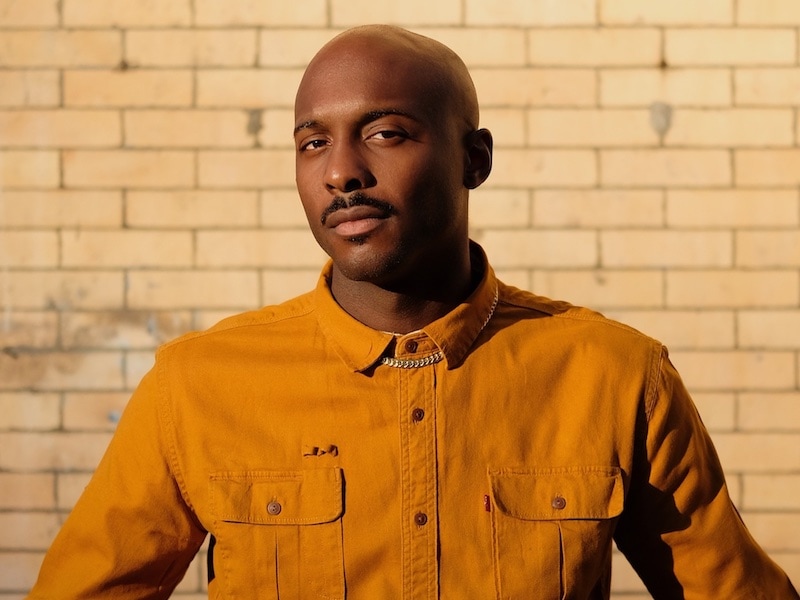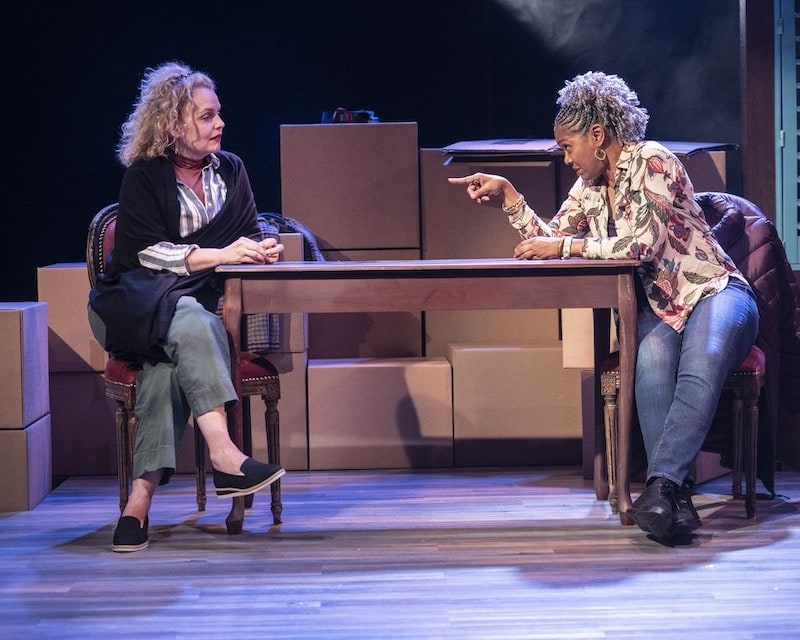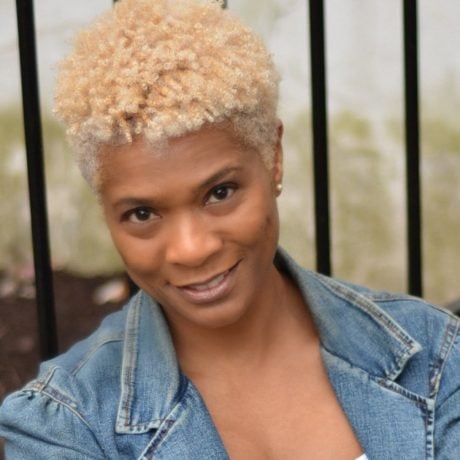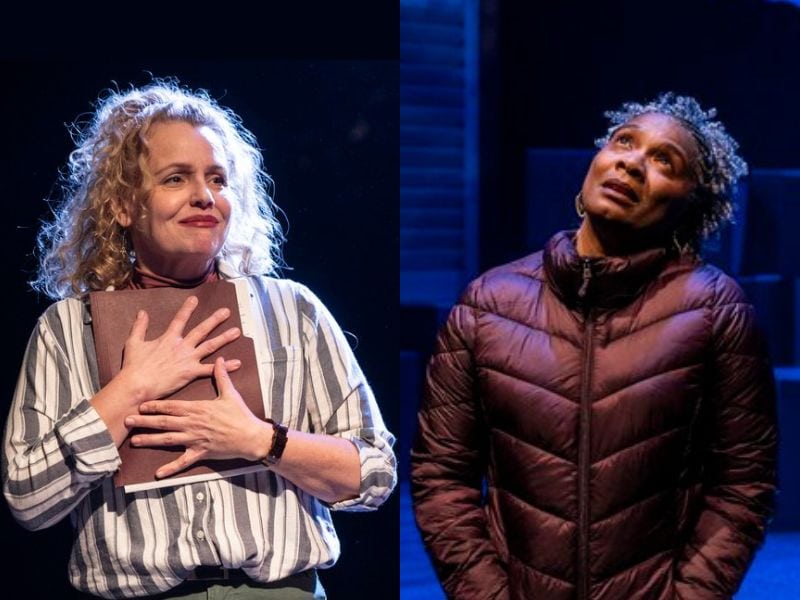The play Shutter Sisters, which is having its regional premiere at 1st Stage in Tysons, Virginia, was written by Mansa Ra (formerly known as Jiréh Breon Holder, he changed his name in 2020).
Mansa Ra’s résumé is impressive.
Prior to the Roundabout Underground production of his play Too Heavy for Your Pocket, the New York Times identified Mansa Ra as one of “Tomorrow’s Marquee Names Now in the Making.” After attending and being molded by the iconic HBCU Morehouse College, Mansa Ra earned an MFA in Playwrighting from the Yale School of Drama. From there he went on to write not only several plays but several episodes of the television series New Amsterdam.
His play Shutter Sisters is about two women: Mykal, who is Black, and Michael, who is white. From the beginning, the way that their lives will echo each other is reflected in their names. Both women work at the same shutter manufacturing company and both are adoptees. The plot revolves around how being adopted has played out in the parallel lives that they have led. But the play is about more than the plot. In the play, the experience of being adopted can be seen as a metaphor for how, from the day we are born, all of us, whether we are literally adopted or not, have to intentionally and consciously construct and maintain our relationships and connections. This means having to acknowledge and deal with such things as how we are wanted or not, how we are welcomed or not, and how the knowledge about ourselves and our pasts is often either intentionally kept hidden or otherwise lost and unavailable. In the play, this metaphor is explored most pointedly as it plays out through issues of race, gender, and capitalism. As the play proceeds, we and the characters discover together how the paths that their lives have taken are more intertwined than they know.
I had the pleasure of speaking with Mansa Ra recently about the play and about himself. Midway through our conversation, Deidra LaWan Starnes, the actor who plays Mykal in Shutter Sisters, joined us. (This conversation has been edited for length and clarity.)

What do you want the audience to know about Shutter Sisters?
Mansa Ra: I really am interested in stories that move beyond some of our traditional conceptions of race relations.
I want to encourage audience members to throw away their expectations. I think a lot of times when we come to a play that we know is about race relations, we kind of expect Driving Miss Daisy, and this is no Driving Miss Daisy.
It’s about two women from different sides of the track who find a way to connect. These are two women who are almost doggedly committed to their careers and then wake up one day and realize there’s a piece missing. And it’s about them trying to discover that piece that’s missing.

I think that the most important thing for the audience to know is that this is a story about yearning for yourself. That’s something that we all can identify with: that there are parts of ourself that we’re either longing for, longing to return to, or longing to discover. That happens to people at every age and every step of life.
And how do we all sit together in this longing? How do I create a space for us all to just for an hour touch that emotion, and touch that emotion deep, and look at it from all sides and not just try to get to the end? It’s not about getting to the end. It’s about creating the space for us to fully feel it. This play is about what is it that our souls yearn for that is connected to our identity. How do we answer “Who am I?” These are two characters who are struggling to answer “Who am I?” And by the end of the play, they’re only a step closer to that. But all of us, I think, are a step closer with them.
While this is a story about these two women who are in the throes of yearning for a fuller identity, my big goal with Shutter Sisters is to tell a different kind of racial reconciliation story that maybe we haven’t seen before.
Most of the reviews I’ve seen of the show treat it as though the play is completely literal and all some reviewers were interested in is the plot as it is literally laid out. But I wondered: “What if this state of being adopted that these women are in is a metaphor for belonging to not just a nuclear family but to a nation or to the human family.” You could look at the state of people who are called African Americans as having been forcefully adopted in this country and then pushed out of that family. The situation would be like Mykal’s in the play. And then “white” people who do not want to be complicit in the nation’s wrongdoing that they see happening are the folks who are adopted and welcomed into the family, but who are not finding a comfortable place there. Their situation would be like Michael’s.
Mansa: Have you seen Ava DuVernay’s film Origin yet? At the end of the movie, the film’s main character gives us this incredible metaphor. She says: all of us in America live in this beautiful house and we’ve inherited it, right? We didn’t build it ourselves. We didn’t build the foundation. We just live in this house. And if we notice that there’s cracks in the foundation or there’s mold, we can’t say, Oh, I didn’t put the mold there. Oh, I didn’t put the cracks there. We actually have to deal with the house that we’re living in. And I think, very similarly, these two women are just trying to make it through, their heads down. Just push through. And I think you’re absolutely right that the metaphor here is they are not to blame for what they’ve inherited, but they are yearning and searching for something deeper, more substantial.
And then ultimately, when we get to that final moment — similar to what happens in the play — we help each other unpack. That is the thing that we can do for one another in America, since we have inherited this traumatic history of slavery, this traumatic history of capitalism, this traumatic history of sexism, we’ve inherited it. It’s not ours, but we live in it. And ultimately what my characters end up doing is connecting. And it takes the whole play to do that. When they finally get to one elder’s home, they open the door, they let each other into their personal private space, their secret memories, their secret dreams, their worries. They can then get on the right path. And for me, ultimately, I think you’re absolutely right. It is a poetic metaphor for a different kind of racial reconciliation story.

Deidra LaWan Starnes: Mansa, I’m so sorry. I know this isn’t about me at all, but I just really need to chime in about how literal some of the reviews have been and how, based on their literal interpretation, some reviewers talk about how there were “missed opportunities” in the show to talk about certain societal issues. And I’m like, “No, we talk about that all the time in this show.” And what I feel that you, Mansa, did so beautifully in the play was remind us that these things, the effort of navigating these issues, is embedded in Michael’s world. This is embedded in Mykal’s world. Without saying, “This is what my play is about.” Instead, you say, “My play is not about racism, sexism, and all of that. My play is about connection. My play is about the roots and the bonds that bring us together as a people.” And I’m so floored that there are reviewers that are still so analytical and so bent on the “well-made play” that they seem to have no idea about the artistry and poetry and metaphor that the play presents them with.
Mansa: I think I’m vibing with you. I think part of that expectation of making overt “soapbox” statements of these social issues is 1) we’re used to seeing it done that way. But the counterpart of the expectation is 2) marginalized people don’t make those statements because it’s part of our world. We’re just doing it. And in this play, I think — I hope — that I put these characters on tracks where the things that are just givens, like gender and race, especially, these characters have that on their backpacks, and at the same time they’re continuing to hike up their mountain of self-discovery, of self-actualization. So for them, it is not about unpacking the backpack of racism. It is unpacking, “Where did I come from? Me and my brothers don’t get along. What is that about? How can I make sure my daughter has the best life?” These are the things that my characters are deeply interested in.
And the play almost invites you to examine your own expectations. Because why isn’t the exploration of these questions compelling enough to you?
The usual expectation is that when you see a Black person on stage, a white person on stage, you think they’re going to argue about something. And that’s not what the play is doing. It’s subverting that expectation. And ultimately, it takes a whole play for these two women (who we know from the beginning are paralleled) to connect. I think that that is a real lived experience that we go through in America, constantly. Constantly.

If you are interested in learning more about Mansa Ra and his other works (and I hope you are!), see his website, Mansara.info. I especially recommend that you listen to the live interview Mansa did on the Reelfoot Forward podcast, which you can access on YouTube here.
Shutter Sisters plays through February 18, 2024, at 1st Stage, located at 1524 Spring Hill Road, Tysons, VA. Tickets are $55 for general admission and are available for purchase by calling the box office at 703-854-1856, going online, or in person before each performance. Limited numbers of seats are offered at $25 and $35 for each performance. Open seating.
Running Time: 90 minutes, no intermission.
The program for Shutter Sisters is online here.
COVID Safety: 1st Stage is now a mask-optional space with select mask-required performances offered for each show (for Shutter Sisters, February 10 at 7:30 pm). See 1st Stage’s complete COVID Safety Information here.
SEE ALSO:
Cozy and warmhearted drama connects ‘Shutter Sisters’ at 1st Stage (review by Caroline Bock, February 4, 2024)




